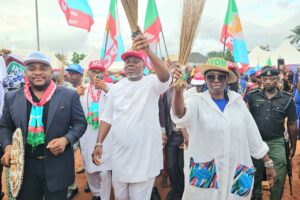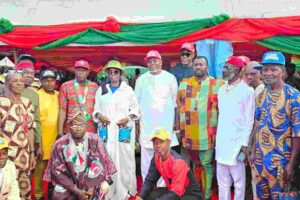
The Inspector-General of Police, Kayode Egbetokun, has rejected the state police proposal, warning that the governors can abuse the outfit for political or personal gains and compromise human rights and national security.
The IG stated this at the national dialogue on state policing organised by the House of Representatives in Abuja, on Monday, with the theme, ‘Pathways to Peace: Reimagining Policing in Nigeria.’
However, the Federal Government insisted there was no going back on the initiative.
At the event, Vice President Kashim Shetimma reiterated the Bola Tinubu administration’s commitment to creating an enabling environment for the establishment of state police across the country.
The nation has been grappling with multifaceted security challenges for the past years with the police authorities unable to roll back the crisis despite the deployment of various strategies, including the military forces across the country.
To address the anomaly, Tinubu and the state governors agreed to come up with modalities that would culminate in the creation of state police to tackle the security crisis.
This was part of the agreements reached at an emergency meeting between the President and 36 state governors at the Aso Rock Villa, Abuja in February.
So far, about 20 governors have submitted reports expressing their support for state police to the National Economic Council.
In furtherance of the move, the House of Representatives on February 20, 2024, passed the Constitution of the Federal Republic of Nigeria (Alteration) Bill 2023 (Establishment of State Police ) HB 617 for a second reading.
IG opposes initiative
The IG, represented by Assistant Inspector-General of Police, Ben Okolo, at the security summit, called for solutions to the challenges confronting the Nigeria Police Force to enable it to serve the people better.
He said, “On the issue of state police, it is the submission of the leadership of the Nigeria Police Force that the country has yet to mature and ready for the establishment of state-controlled police.
“There is the potential for abuse of power by the state political leadership. State governors could use the police forces under their control for political or personal gain and compromise human rights and security.”
Okolo stated that instead of establishing state police, “The Nigeria Security and Civil Defence Corps and Federal Road Safety Commission should form a department under the Nigerian police.’’
Responding to the IG’s arguments, the Vice President, who represented President Tinubu, affirmed that the state police initiative was not timely.
“This government under the leadership of President Bola Tinubu is acutely aware of the complex security issues that abound in places. As such, we are continually developing methods to address these challenges effectively.
“The President believes that the path to effective security is through adaptive reforms catering to our diverse situations and circumstances. This can only be achieved by carefully reviewing various options,” the VP stated.
The Senior Special Assistant on Media and Communications to the VP, Stanley Nkwocha, noted that the Tinubu administration knew Nigeria’s complex security issues and would continually develop and refine its strategies and methods to address the challenges effectively.
Shetimma stated, “In our deliberations, let us consider the implications of state policing from multiple perspectives. We must evaluate its potential to improve response times to emergencies, adapt to specific local challenges and increase accountability.
“At the same time, we must address concerns related to the standardisation of training, oversight, and the safeguarding of civil liberties.
“We view the outcomes of today’s deliberations as crucial inputs that will guide the government’s actions towards reforming the institution of the police and achieving a safer and more secure Nigeria.”
He believed that Monday’s dialogue would present an opportunity to listen, understand, and propose solutions that bridge gaps.
The VP expressed delight that the 10th House of Representatives under Speaker Tajudeen Abbas keyed into state policing, noting that “the involvement of the legislature in executive reform proposals ensures continuity and synergy.
“Let us use this opportunity to engage and explore every option with the seriousness and diligence they demand. The President is committed to listening to your recommendations and insights, which are invaluable to shaping the policies that will lead us toward a more secure and just society,” he added.
Lending his support for state policing, ex-President Goodluck Jonathan said what is debatable is the manner it would operate alongside the federal police.
Jonathan backs reforms
“There is no way we can manage our internal security if states will not have their police. The issue is not states having their police but how they will function vis-a-vis the national security architecture.”
According to him, there should be sufficient deliberations on the constitutional matter particularly on how political actors at the sub-national level would hijack state police and use it against their opponents.
“We should not waste our time debating whether we should have state police or not. We had it before in this country but the military scrapped it because of abuse. That is the area we should concentrate on.
“How do we manage state police so that it will not be abused by state political actors? If state political actors are abusing state police and using them to harass and make life miserable for people who don’t belong to their political parties, will the commander-in-chief sit down and watch? Or will order the military to overrun the state police?,” he asked.
Jonathan in a veiled reference to alleged state governors’ desperation for power, also called for a review of the operations of the Independent National Electoral Commission.
“Even in cosmopolitan states, If the governor is in Party A, you will see party B and Party C winning elections as Senators and House of Representatives members but come Local Government elections, no other party wins the chairmanship and councillorship elections. It is only the party that produces the governor that clears all the council seats. This is not possible,” he declared.
He also called for the establishment of a national border force and coast guards.
“While we are debating on conducting a public hearing on state police, the issue of national border force must be considered. We can say the customs and immigration carry weapons and they are in charge of border control but they cannot play the role of national border guards because customs and immigration stay in controlled routes.
“Criminal elements don’t pass through those controlled routes. It is when we have national border guards that we will be able to control these elements. Yes, customs and immigration carry weapons, but they are not sufficiently trained to confront these criminal gangs,” he added.
Jonathan voiced his delight that the collective discourse is now focused on how state police should be operated.
“There is no need to debate about state police. The issues of state police and the Coast Guard were accepted at the 2014 National Conference.
“The Nigeria Customs Service and other agencies at the border are not trained to deal with criminal gangs,” said Jonathan.
He recommended rejigging the Act that established the Independent National Electoral Commission so that the police are not used for election malpractices in states.
The Speaker of the House of Representatives, Tajudeen Abbas, thanked participants at the dialogue, especially President Tinubu, Shettima, Abdulsalami and Jonathan for lending their voices to the state police discourse.
Abbas said the contributions of the former heads of state would provide direction to the dialogue, given the dimension of insecurity in the country.
In his address, the Deputy Speaker, Kalu, said the National Assembly is considering a bill to establish state police.
He stressed that other countries, such as “the United States of America, have a multi-layer police system with federal, state, county and the FBI.”
On his part, a former Head of State, General Abdulsalami Abubakar (retd.) while expressing support for state police, called for a role for traditional rulers in the constitution to enable them to play their part in the security of the people at the grassroots.
“Let us look into the roles of our royal fathers as we are discussing the role of state police,” he advised.
The retired Army general stressed that governors must be accountable to the people they govern while also urging the citizens to obey the laws of the land as enshrined in the constitution.
There was a mild drama at the national dialogue when AIG Okolo committed a gaffe which sent the participants reeling with laughter.
In the order of protocol, the police boss recognized Shettima but instead of adding the Grand Commander of the Order of the Niger, GCON, he said, “His Excellency, the Vice President, Federal Republic of Nigeria, GSM.”
The gaffe elicited a loud laughter forcing the compere, Mrs Maupe Ogun-Yusuf, to apologise on behalf of the AIG.
Okolo, however, corrected himself before leaving the podium.
The Vice President, while reading the President’s address, put the matter to rest, saying, “Where is my friend, the AIG Ben Okolo? Anyone can make a slip but it takes courage for a man who made a slip to correct himself.”
Present at the event were the Deputy Senate President, Barau Jibrin; Minister of Police Affairs, Ibrahim Gaidam; Minister of Budget and National Development, Dr. Atiku Bagudu, and Minister of State for Agriculture, Mustapha Shehuri.
Others were former Minister of Interior, General Abdulrahman Dambazau; the Sultan of Sokoto, Sa’ad Abubakar III; Ooni of Ife, Oba Adeyeye Ogunwusi; the Obi of Onitsha, Nnaemeka Achebe; the Emir of Zazzau, Shehu Idris, among others.
Speaking on state policing, the Kebbi state government has expressed its readiness to ensure the successful implementation of the initiative to tackle crime in the state.
Reacting to the statement credited to the IG on the issue, the Chief Press Secretary to the governor, Ahmed Idris, said the state is fully mature to handle state police.
“We are more than mature to handle the state police. The local vigilantes in the state are doing a lot in promoting peace.
“If we can use local vigilantes to improve the security in the state, why not the same with the state police?” he added.
On his part, the Commissioner for Information in Ekiti State, Taiwo Olatunbosun, said what is important to the state is community policing which could strengthen the country’s security network.
Olatunbosun said that the IG’s statement on the matter of state police ‘’is a top-level security issue which I am sure the Council of States, which is empowered under the constitution to deal with such matters will resolve.”
He further stated, “Whatever it is that will make us enjoy a sort of community policing that will encourage the security network, the security architecture of the country and the state is what is important to us.”
He expressed confidence that the political leadership would resolve the security issues.
Meanwhile, the Gombe State NSCDC has rejected the IG’s suggestion that the NSCDC should be merged with the police.
The Public Relations Officer of the corps, Gombe State Command, Saad Buhari, pointed out that the Oransaye Report was clear on the issue of merger, adding that the police boss’ proposal was not feasible.
He said, “Do you have a copy of the Oransaye’s Report? It can’t be feasible to have a merger of both security agencies. It was alleged that it was due to inherent lapses of the (police) force that the civil defence was created.
“They are on their own, we are on our own. I don’t think it (merger) will solve the contemporary issues of modern enforcement. How will that solve it?’’
“The police are doing their best, the civil defence is doing their best. Oransaye Report is clear that we will remain an integral part of law enforcement,” he added.
Source: The PUNCH




